- Leading Business Simulation Platforms In 2024
- How To Choose A Business Simulation Platform?
- Must-Have Features Of Business Simulation Platforms
- Comparing The Top Business Simulation Platforms
- Learning Objectives of Business Simulation Platforms
- Conclusion
- Frequently Asked Questions
Choose A Business Simulation Platform: A Comparison Of Top Providers
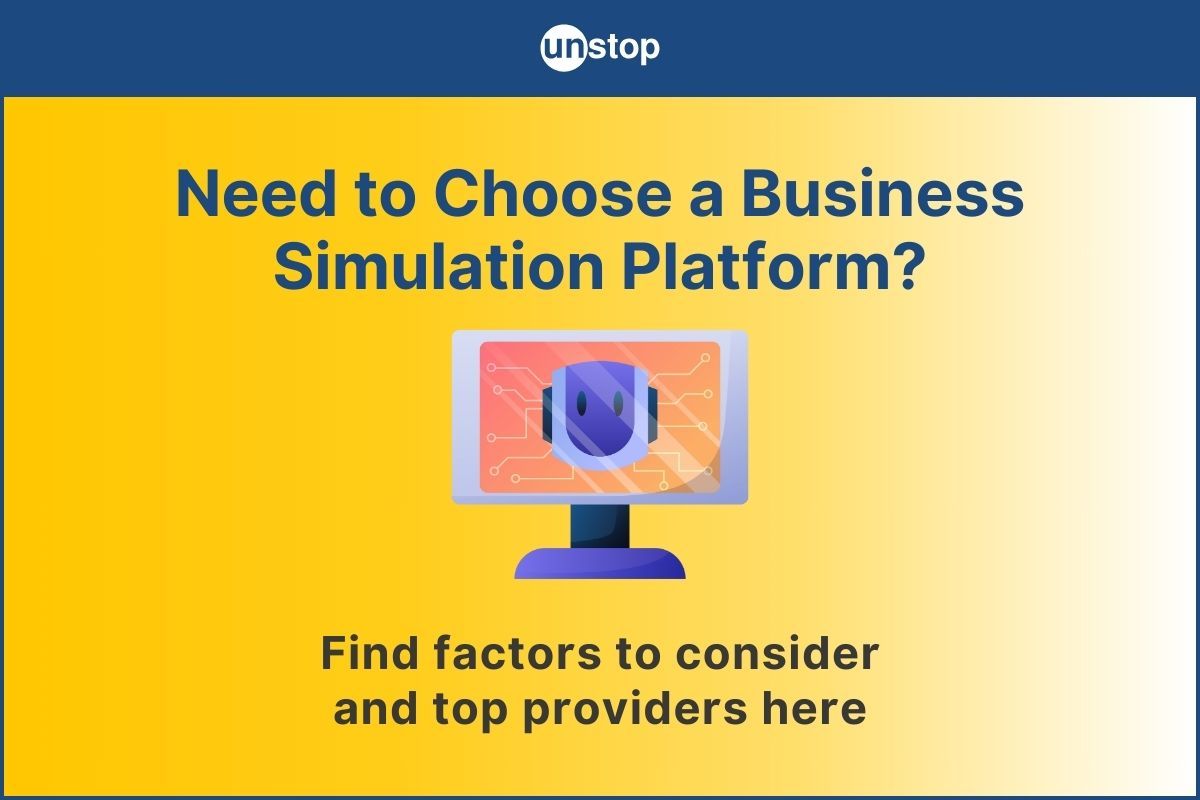
Business simulation platforms, such as business simulation games and software like marketplace simulations, are powerful tools for learning and development. These platforms boost learning outcomes by providing a virtual environment where individuals can experience real-world business scenarios, make decisions, and witness the outcomes in a risk-free setting.
By simulating market dynamics and operational challenges, they offer an immersive understanding of business concepts. This hands-on approach enhances participants' strategic thinking, decision-making skills, and overall business acumen.
Leading Business Simulation Platforms In 2024
| Platform | Strengths | Weakness |
| Capsim | Industry-specific focus, realism, competitiveness | Higher costs, limited customization |
| Cesim | Extensive range of simulations, multidisciplinary | Broad focus, might not be deep in specific areas |
|
Chanakya and BizLab by AIMA |
Decision-making focus, leadership development | Less industry focus, limited customization |
| Unstop | Provides data-driven insights and seamless integration | Focus on domains, not industry |
| SimInsights | Diverse range of online, instructor-led, and hybrid business simulations | Expensive and requires compatible technological infrastructure |
| Gamelearn | Soft skills development, gamified learning | Higher costs, focus on soft skills |

How To Choose A Business Simulation Platform?
Organizations looking to choose a business simulation platform should consider the learning objectives, features, budget, and other factors before deciding:
Consider your budget
Prices can vary significantly depending on the platform, features, and customization options. Some platforms may charge a one-time fee for a perpetual license, while others may require a monthly or annual subscription. It is also important to consider any additional costs that may arise, such as training or support fees.
Investing in a business simulation platform can be a significant expense, so it is important to assess the cost implications and ensure that they align with the available budget
Industry and focus
Select a platform with simulations relevant to your specific industry or business area. Different industries have unique challenges and dynamics, so a platform that caters specifically to your industry will provide a more relevant and realistic experience.
For example, if you work in the healthcare industry, a simulation platform that focuses on healthcare management will allow you to practice decision-making in a context that closely resembles your actual work environment. This industry-specific focus ensures that the skills and knowledge gained from the simulation are directly applicable to real-world situations, enhancing the learning experience.
Alignment with Objectives
When choosing a business simulation platform, it's crucial to assess its compatibility with the learning objectives. For instance, if the goal is to enhance decision-making skills, ensure that the platform offers scenarios and challenges that directly contribute to this objective. The simulations should mirror real-world business situations relevant to the learning outcomes.
The platform's ability to simulate various business environments and challenges should be in line with what learners need for skill development. It must provide a range of scenarios that align with specific learning objectives, such as financial management or strategic planning.
Considering how well the simulation activities match up with educational goals is essential in ensuring that learners derive maximum benefit from their experience.
Must-Have Features Of Business Simulation Platforms
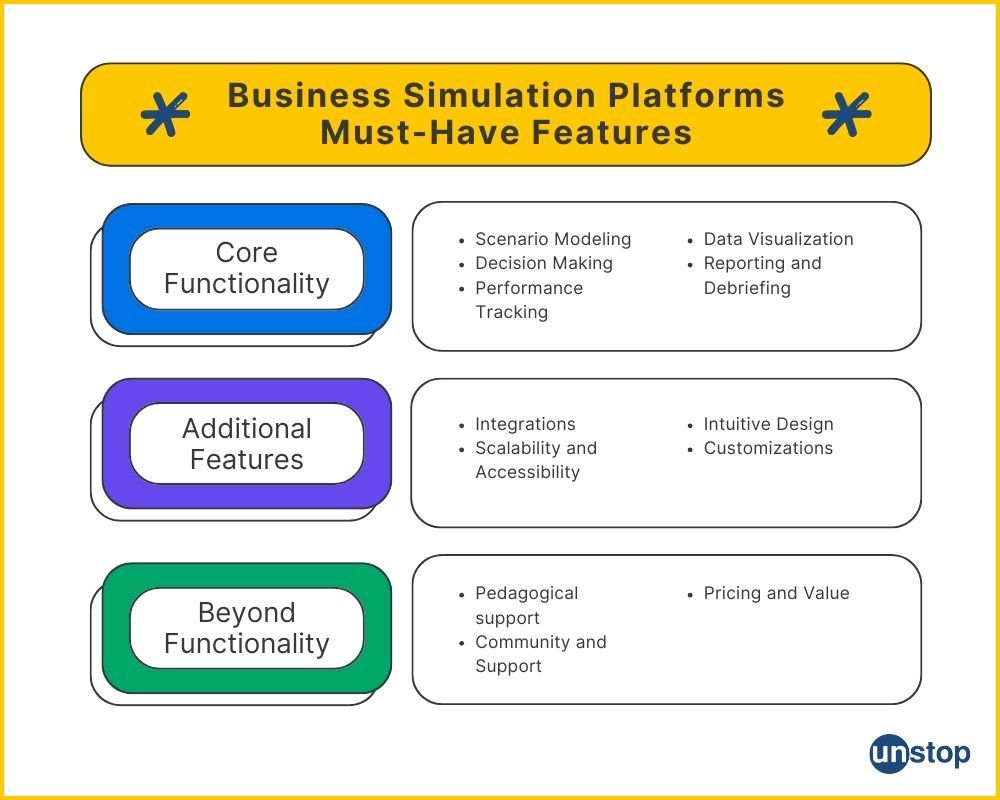
When choosing a business simulation platform, there are several features to consider "must-have" for a successful and impactful experience:
Core Functionality:
- Scenario Modeling: The ability to create different scenarios and test potential decisions in a safe environment. This includes setting key parameters, variables, and constraints to represent specific business challenges.
- Decision Making: Provide participants with opportunities to make strategic decisions, manage resources, allocate budgets, and navigate competitive landscapes.
- Performance Tracking: Track and analyze the outcomes of various decisions in real-time, offering feedback and highlighting key metrics like profits, market share, and customer satisfaction.
- Data Visualization: Present data and results in engaging and interactive ways, using dashboards, charts, and graphs for easy understanding and analysis.
- Reporting and Debriefing: Generate reports and facilitate debriefing sessions to review the simulation results, identify lessons learned, and encourage reflection on decision-making processes.
Additional Features:
- Intuitive Design: An intuitive and user-friendly interface is essential for a smooth user experience, especially for participants with varying levels of technical expertise.
- Customization: The ability to customize the simulation experience to align with specific learning objectives and industry contexts is crucial for effectiveness. For example, the ability to modify variables like market conditions, competition intensity, or economic factors to closely match intended learning outcomes.
- Integrations: Compatibility with existing data sources and other business tools can add value and streamline the workflow.
- Scalability and Accessibility: Choose a platform that can accommodate various group sizes and offer flexible deployment options, including cloud-based access. Another aspect worth evaluating is whether the platform provides accessibility across various devices such as laptops, tablets, or smartphones. This flexibility ensures that learners can engage in simulation activities regardless of their preferred device choice or location.
Beyond Functionality:
- Pedagogical Support: Look for platforms that offer learning materials, guides, and facilitation resources to maximize the educational impact of the simulation.
- Community and Support: Access to a supportive community, user forums, and technical support can enhance the platform's usability and address any challenges.
- Pricing and Value: Consider the platform's cost structure, licensing options, and overall value proposition for your specific needs and budget.
Remember, the ideal platform will depend on your specific goals, target audience, and budget. Take the time to research, compare options, and evaluate how each platform can help you achieve your desired outcomes.
Comparing The Top Business Simulation Platforms
1. Capsim
Capsim offers a variety of industry-specific simulations like Manufacturing, Retail, Technology, and Services. These simulations are highly immersive and realistic, allowing participants to make strategic decisions in a competitive environment.
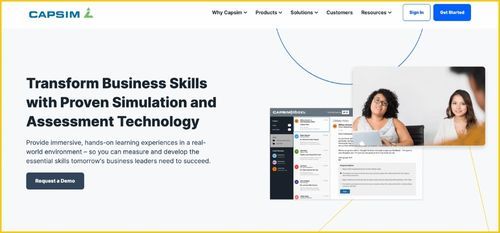
- Services: Capsim offers CapismCore (Business Simulations), CapismInbox (Inbox simulations for assessing and developing soft skills), CapismInbox-XM (Assessments), and academic simulations designs to make students job-ready.
- Key Features: Scoring and Scenario Customization, Team Chat, Real-time Alerts, Automated Debriefs and Quick Onboarding
- Client-Base: U.Penn, NYU, Microsoft, Caterpillar, Cummins, etc.
- Other Available Resources: Blogs, Training modules for instructors, Masterclass and webinars, eBooks, etc.
2. Cesim
Cesim is a global leader in multilingual, multidisciplinary business simulation games covering various business functions and challenges. Cesim simulations are available online and offline.
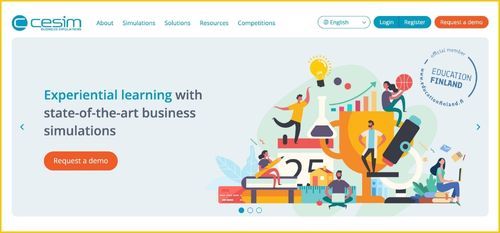
- Services: Cesim offers 11 different types of simulations across 4 categories - Business, Management & Strategy, Marketing, Hospitality, and Industry-specific. All simulations are offered in English and French. Some simulations are available in additional languages, like Turkish, Italian, Spanish, German, etc.
- Key Features: A unified admin tool, logs and metrics to track data, simulation-specific integrated quizzes, and results after each round.
- Client-Base: University of Glasgow, University of Sydney, NTU Singapore, Peikko, Telecom Austria, etc.
- Other Available Resources: Blogs, Guidebooks, Webinars, Explainer videos, and Interviews with Experts.
3. AIMA Chanakya and BizLab
AIMA Chanakya is a popular simulation platform in India, specifically designed for management development. It focuses on decision-making, strategy, and leadership skills, making it suitable for corporate training programs. Chanakya is AIMA’s proprietary software to conduct simulations. AIMA BizLab is a virtual business laboratory offering hands-on experience in management concepts.

- Services: AIMA offers simulations for both corporates and institutes. For corporates, AIMA conducts Chanakya Workshops and MDP (Management Development Program) and for institutes, it offers FDP (Faculty Development Program) and Management Fest (management competition for management professionals and students). AIMA BizLab (virtual business lab) is available for both corporates and institutes.
- Key Features: Chanakya has 4 modes, and each simulation has multiple rounds and hypothetical scenarios that build a dynamic environment. BizLab offers a hall of fame for top scorers, detailed reports, accessibility, and practice sessions.
- Client-Base: AMET University, Asian Business School, Bennett University, BML Munjal University, etc.
- Other Available Resources: AIMA conducts multiple national competitions for both, corporate managers and management students.
4. Unstop
Unstop provides business simulations that are optimal for assessing competencies and engaging with participants in an interactive manner. The platform offers simulations in six different categories, namely Strategy, Entrepreneurship, Economics, Marketing, Operations, Finance, and Human Resources.
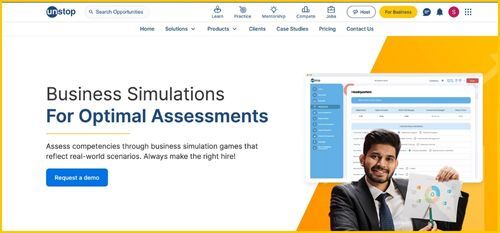
- Services: Unstop offers 29+ simulations, spread across the six categories. For example, the finance category has 8 different simulations for Portfolio Management, M&A, Financial Accounting, etc.
- Key Features: Data-driven dashboard, seamless integration with other assessments, multi-user simulations, domain-tailored job simulations, and unmatched execution support.
- Client-Base: KPMG, EY, Nestle, Aditya Birla Group, etc.
- Other Available Resources: Online quizzes, ideathons, hackathons, data science hackathons, and more.
5. SimInsights
SimInsights provides AR/VR/AI cloud-based SaaS software and services. Enterprises can use these simulations to create immersive, interactive and personalized training programs. Per SimInsight, VR/AR/AI plays a crucial role in boosting engagement, reskilling, and upskilling while delivering ROI.

- Services: SimInsights provides HyperSkill (a no-code 3D simulation software for VR and AR) and Skillful (Simulations for different skills, from Aviation to X-Ray).
- Key Features: Personalized Learning, Evidence Centered Design, Knowledge Engineering, Support, High Accessibility, and Broad Coverage across multiple disciplines.
- Client-Base: Texas A&M, Michigan Tech, Semikron, IIT-BHU, etc.
- Other Available Resources: Webinars, Blogs and HyperSkill Integrations. HyperSkill Integrations can support organizations’ AI or XR project needs by providing access to essential hardware, offering software and authentication support, and connecting with experienced AI and XR specialists.
6. Gamelearn
Gamelearn's simulations primarily focus on soft skills development like leadership, communication, and negotiation. They offer simulation and gamification-based programs to train employees for professional growth and team performance.

- Services: Simulations and video games provide three solutions - training, productivity, and communication. Another solution that Gamelearn offers is the ‘Editor’ for e-learning creators. The Editor allows users to create customized simulations without writing code.
- Key Features: Simulation platform Editor is multi-device and can be translated into 30 languages. It’s scalable, accessible, and cloud-based.
- Client-Base: Unilever, OTIS, Nivea, Michelin, Volvo, etc.
- Other Available Resources: Whitepapers, Blogs, Case Studies, and Reports.
Learning Objectives of Business Simulation Platforms
Enhance Critical-Thinking Skills
Business simulation platforms are designed to enhance critical thinking skills in individuals. By immersing users in realistic business scenarios, these platforms encourage them to think critically about various challenges and opportunities. For example, a user might have to analyze market trends, financial data, and consumer behavior to make informed decisions within the simulation.
Develop Problem-Solving Abilities
This process of analyzing information and making decisions based on it helps develop problem-solving abilities. Users learn how to identify issues, develop potential solutions, and determine the most effective strategy within the simulated business environment. This hands-on experience allows them to understand the consequences of their decisions without real-world risks.
Improve Decision-Making Capabilities
Moreover, engaging with a business simulation platform can significantly improve decision-making capabilities. Users are required to weigh different options and assess their potential outcomes before choosing a course of action. This practice enables individuals to make more effective decisions by considering multiple factors that impact business success.
Experience Interactive Learning
These platforms offer an interactive learning experience where users can experiment with various strategies and observe their direct impact on simulated businesses. As a result, individuals gain practical insights into decision-making processes that can be applied in real-world professional settings.
Conclusion
Business simulation platforms offer a dynamic and effective way to develop essential business skills in educational and corporate settings. From experiential learning to the customization and flexibility of these platforms, the impact of business simulations on skill development is undeniable. Choosing the right business simulation platform is crucial for maximizing the learning outcomes and ensuring a tailored experience that meets specific objectives.
To choose a business simulation platform for educational or corporate use, it’s important to carefully consider important factors such as budget, learning objectives, compatibility, etc.
Frequently Asked Questions
1. What are the key benefits of using business simulation platforms in education and corporate training?
Business simulation platforms offer hands-on learning experiences, allowing participants to apply theoretical knowledge in realistic business scenarios. They enhance decision-making skills, teamwork, and strategic thinking while providing a safe environment for experimentation and learning from mistakes.
2. How do business simulation platforms contribute to skill development?
By offering immersive experiences, these platforms help individuals develop critical skills such as financial acumen, strategic planning, risk management, and market analysis. Participants can practice making decisions in real-world scenarios without facing actual financial or reputational risks.
3. What factors should be considered when choosing the right business simulation platform?
When selecting a business simulation platform, it's essential to consider factors such as customizability to align with specific learning objectives or industry needs, scalability for accommodating different group sizes or complexity levels, ease of use for both facilitators and participants and post-simulation analytics for performance evaluation.
4. How does competition play a role in enhancing learning outcomes through business simulations?
Competition within simulations motivates participants to strive for better results by applying their knowledge effectively. It fosters a sense of urgency similar to real-world situations while encouraging individuals to analyze competitors' strategies critically and adapt their own tactics accordingly.
5. In what ways do business simulations support experiential learning?
Business simulations provide an immersive environment where participants can experiment with various strategies and observe the consequences firsthand. This experiential approach allows learners to gain practical insights into complex concepts that might be challenging to grasp through traditional classroom methods.
Find out more about how business simulations support experiential learning here.
Suggested Reads:
I’m a reader first and a writer second, constantly diving into the world of content. If I’m not writing or reading, I like watching movies and dreaming of a life by the beach.
Login to continue reading
And access exclusive content, personalized recommendations, and career-boosting opportunities.
Subscribe
to our newsletter
Blogs you need to hog!
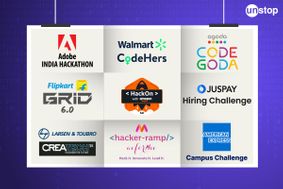
Organize Hackathons: The Ultimate Playbook With Past Case Studies

What is Campus Recruitment? How To Tap The Untapped Talent?
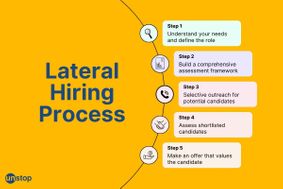
Lateral Hiring: A Complete Guide To The Process, Its Benefits, Challenges & Best Practices
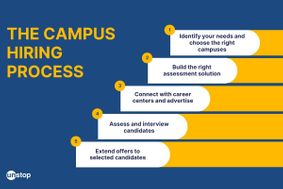










Comments
Add comment